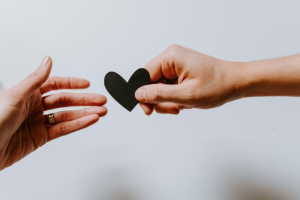May was Mental Health Awareness Month – how did that impact you? Were you aware that it was Mental Health Awareness Month? Did the companies, corporations, and charitable organizations you interact with or came across make any statements about it? Perhaps they did, and you felt exposed. Perhaps they didn’t, and you felt invisible.
You may have recently received a mental health diagnosis or have a longstanding struggle with mental health. You may have a logical understanding of mental health

awareness but still feel a sense of shame or guilt surrounding your state of mind or the state of mind of a loved one. Perhaps you’re involved in the mental health community or industry but feel like nobody else in your immediate circle participates or provides a safe space for you to speak about the mental health challenges faced by yourself and/or others.
For a variety of reasons, mental health struggles and mental illness can be extremely isolating.
The truth is that mental health issues impact the lives of every single person on this planet, whether they themselves struggle or have loved ones who struggle. There is no guaranteed escape from it; even those who appear to “have it all,” such as successful public figures, struggle with their mental health. Have you watched Oprah’s new documentary “The Me You Can’t See”? It features people from all around the world and from all walks of life, unpacking their struggles to accept and tackle the issues they face and/or have faced regarding their mental health.
One of the reasons people feel so alone in their mental health struggles is because documentaries of this nature are not only relatively new to our society but few and far between. There is still a lot of awareness and understanding that needs to happen around mental health; while we have come a long way in de-stigmatizing in recent years, we are not all the way there.
The Stigma Around Mental Health Issues:
1. It is the invisible illness and pain that no one can see:

Physical health issues and concerns have always been handled differently than any mental health issue. For example, when someone has cancer, and there is regression, we rally up to provide support to the one battling cancer. However, if someone relapses on their recovery from their addiction or eating disorder, we are quick to blame.
Somehow, we believe that a disease of the body is out of a person’s control, but a disease of the mind should be controlled by the mind.
A physical illness can be viewed on scans and often has visible side effects on the outside of the body: weight loss or gain, hair loss, changes in skin tone and/or texture, and so forth. While a downturn in mental health can manifest in
ways that might be noticed, most of the suffering happens inside the person, unknown and unheard to the outside world.
We are also often alone when at our lowest; we either isolate because we are struggling, or we begin to struggle because we are isolated. Think of all the times you have gotten into bed, and all your anxieties have risen to the surface. Most of us don’t call someone to come see us in our misery at bedtime; we don’t want to disrupt anyone trying to sleep. Therefore, what people see of us is only part of the picture. Perhaps, even when people see us, we are happy and doing well because we are with a loved one, and that lifts our spirits. When we lost Robin Williams and the chef Anthony Bourdain to suicide, we were all quick to say, “But they were so happy,” or “They looked so happy.” Mental health challenges don’t look anyone way or even like anything at all. They vary from person to person. And they vary depending on the circumstance.
2. Fear of being judged and appearing “crazy”:
If you have a family history of mental health struggles and have seen the family handle it poorly, it can make it harder to be forthcoming about your struggles. Maybe you have seen

that the people around you are dismissive of the feelings expressed by the person who struggles. Perhaps you have seen exclusion from events or harmful interference in the person’s life. It
can be difficult, then, to feel that you can come forward with your issues and still be respected and taken seriously.
I also notice my clients delaying or refusing to take medication because they want to see themselves “do without it” or “see how long I can go” without being on medication. I am sad and disheartened to see how many of my clients try to “make it without medication” to see how far they can go without utilizing it. When we explore it further, the truth behind their decision is about feeling embarrassed and feeling “crazier” than other people if they have to take medication.
Here is what I tell them that I want to say to you: There is no secret VIP club or special trophy for those who can manage their mental illness without medication. You don’t have to prove yourself to anyone. This is not a competition! You are not any “less crazy” because you can manage your anxiety, OCD, depression, or other issues without medication.
3. Misinformation and minimization:

Sadly, we misuse mental health diagnosis words. If we experience a sudden change of heart or feel indecisive, we are quick to say, “Oh, I think I am Bipolar.” Or when we simply like keeping our closet orderly or like things a certain way, we might say, “OMG, I am so OCD about this.” A couple of years ago, I saw a sweatshirt at Target that said “OCD – Obsessive Christmas Disorder.” Thankfully, Target pulled this insensitive product off their shelves immediately; but the damage was done. This type of misuse of mental health diagnosis not only reinforces the lack of knowledge surrounding these afflictions, but also mocks real people who struggle with these very real and debilitating conditions and undermines what the struggle truly is. Obsessive-Compulsive Disorder is not a desire to keep your closet tidy; having it minimized by being equated to something so manageable is hurtful and dangerous.
Facing minimization can be exceptionally damaging. Perhaps you have been told “just stop drinking” as if it is that simple to conquer an addiction. Sometimes, people offer “advice” about dealing with feelings or issues that they think show resolve or positivity, such as “just get over it,” “it can’t be that bad,” or “you are just taking it too personally, don’t be so sensitive.” Rather than successfully reframing the circumstance as manageable, these comments leave the person feeling belittled and alone as if they’ve been told that there must be something wrong with them if they can’t just move on from the situation in the blink of an eye.
It can be difficult to imagine marrying our independence and confidence with the need for assistance and support, but that is often the situation we have to grapple with as we acknowledge and work on our mental health struggles. We may worry that we’ll be treated or adjudicated differently at work or school or that we will have a more challenging time forming solid interpersonal relationships. But the truth is that by showing up as our whole selves, we can rewrite the narrative surrounding mental illness and mental health issues. The trick is to support ourselves in our journey so that we can be the change we want to see in this area!
3 Skills to Build Stronger Mental Health
1. Seek and build a support network:

There is a quote from Brené Brown that says,
“We don’t have to do it all alone; we were never meant to.” This is crucial in tackling all sorts of obstacles or difficulties in life. Your support network might comprise loved ones, people who begin as strangers, those who struggle with mental health, and those who do not. The important thing is to know that that network is there for you and believes in you. Building a support system can feel big and overwhelming sometimes, but there are steps to take that make the process easier.
You can also seek help by joining support groups such as The National Alliance on Mental Illness (NAMI) or the Depression and Bipolar Support Alliance (DBSA). The online world is a vast resource that can connect us in ways we could never have hoped in the past. Not everyone has access to or comfort with in-person collaboration, at this time in our history especially. The perfect group or collection of people might live scattered across the country, the continent, or the globe. You may find comfort in beginning your journey online before meeting with your support network in person. As you seek support, you may add a therapist to your network and transition from online meetings to coming for in-person sessions in Woodland Hills, CA.
2. Change your inner narrative around mental health issues:
The fact is: change starts with you. It begins with you challenging and changing the stories you have been telling yourself about your depression, addiction,

or OCD. You may have been telling yourself that you are limited or broken. That you should be able to “function better”; others would be able to if they were in your shoes. You may have been speaking to
yourself in harmful ways, perhaps not knowing that you were mistaken. Because the truth is that there is nothing wrong with you. You are not broken. And most importantly, you are not alone.
It can be helpful to remind yourself of how many others deal with similar situations by consuming real-life media that relate to your struggle. You might want to make time to listen to a podcast such as The OCD Stories podcast. Another helpful way to seek support and validation can be through watching documentaries and TED talks. One of my favorites is a TED talk from Johann Hari called “Everything you think you know about addiction is wrong.” One of the most powerful messages from his talk is his comment that “the opposite of addiction is connection.” And what makes this message so powerful is that this applies to any mental health struggle. When you change your internal dialogue about mental health, it allows you to reach out and connect with others, obtain and give support, and de-stigmatize your struggle for yourself.
3. Join advocacy work:

There are a few benefits to participating in events and organizations that advocate for mental health support and initiatives. Taking this action allows you to find and connect with a support network; it makes the world a better place for yourself and others, and it provides purpose and motivation. All of these can work together to create a silver lining of the issues and obstacles you face as you make your way along your mental health journey. Being involved and immersed in a community of people who are in the same boat as you also provide ongoing opportunities to unlearn some of the negative thoughts of stigmas you might apply to yourself and to increase your wealth of knowledge.
Committing to joining in advocacy work doesn’t have to feel like biting off more than you can chew. Some events are shorter-term, such as mental health days, and walks such as OCD Walk or Suicide Walk. There are ways to get involved in online forums, initiatives,, and organizations if it feels less vulnerable to start that way.
We all have mental health, and it is just as important as our physical health. Some of us may need long-term support for our mental health, such as medication and/or therapy. Some of us may find ourselves in times of our lives where we need a little extra support. It is important to remember that a need for help, whether it is for a little while or for forever, in no way negates your worth or the validity of your emotions or experiences and that you are not alone.
Embracing You Therapy Group Practice
Here at Embracing You Therapy, we invite you to explore with us how life would be different if you had more control over your thoughts and emotions, and we invite you to consider that it is possible to accept things just as they are, embracing imperfections to create a gentler place for calm in your life.
Let’s learn what drives your unique perspective on anxiety and stress. Then, let’s find the tools-your unique tools-that help you respond to life in a healthy, calm way. Contact us today for your complimentary 15-minute phone consultation with one of our Client Care Coordinators.





